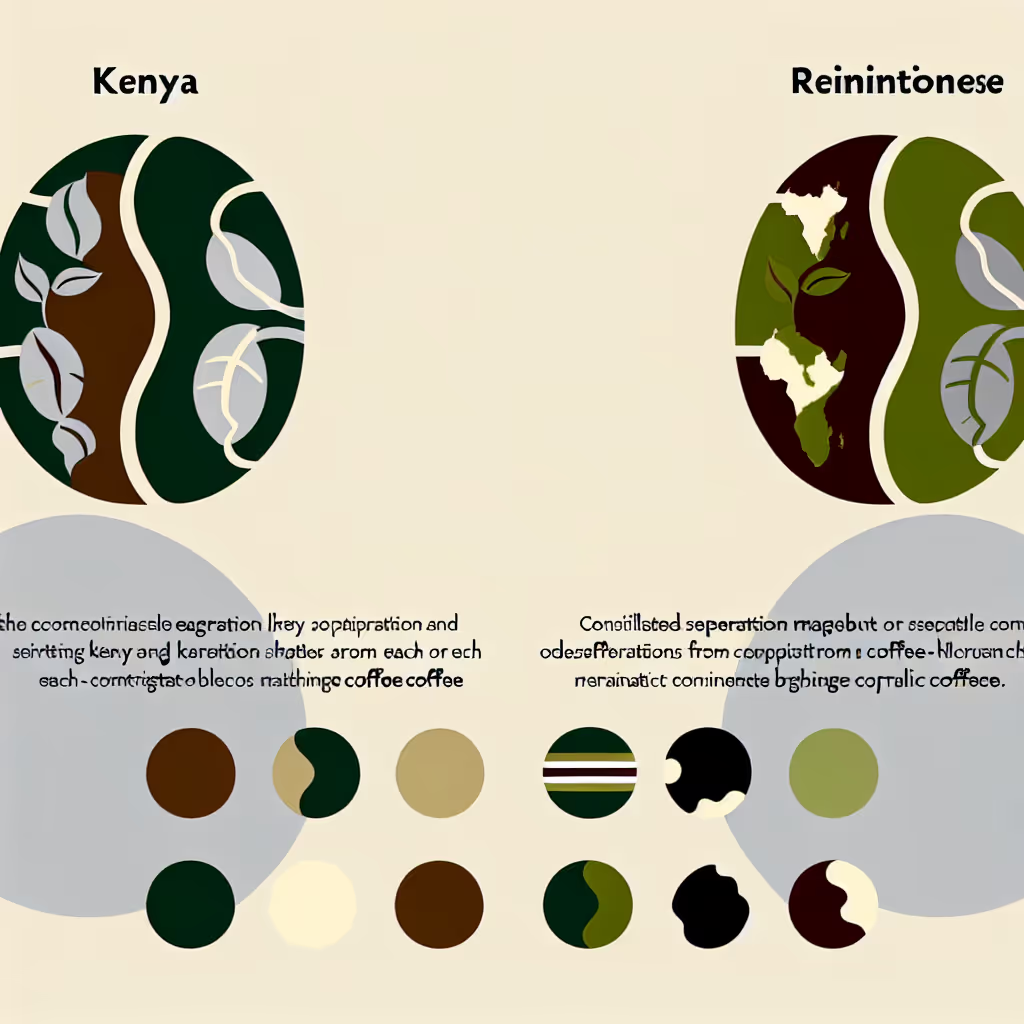Kenyan Vs. Papua New Guinean Coffee
This comparison explores the distinct qualities of Kenyan and Papua New Guinean coffees, highlighting their unique flavor profiles, growing conditions, and cultural significance in the specialty coffee world.

Brief Description
Kenyan coffee is renowned for its bright acidity, full body, and complex flavor profile. Grown in the rich volcanic soils of the Central Highlands, these beans benefit from ideal climate conditions and meticulous processing. The result is a cup that's bold, wine-like, and often described as the 'connoisseur's choice'. With notes ranging from blackcurrant to citrus, Kenyan coffee offers a truly unique and memorable tasting experience.
Papua New Guinean coffee is a hidden gem in the world of specialty coffee. Grown in the lush, mountainous regions of this island nation, these beans offer a unique flavor profile that combines bright acidity with earthy undertones. The country's diverse microclimates and traditional farming methods contribute to the coffee's distinct character, making it a favorite among adventurous coffee enthusiasts seeking new and exciting taste experiences.
Importance of Comparison
Comparing Kenyan and Papua New Guinean coffee origins is crucial for coffee enthusiasts seeking to expand their palate and understand the nuances of single-origin beans. These two origins offer contrasting flavor profiles and represent different coffee-growing traditions, providing valuable insights into how geography, climate, and processing methods influence the final cup quality.
Key Attributes
Origin
Kenyan
Papua New Guinean


Consumer Guide
When choosing between Kenyan and Papua New Guinean coffee, consider your flavor preferences. Kenyan coffee is known for its bright acidity and complex profile with notes of blackcurrant and citrus, ideal for those who enjoy a bold, wine-like cup. Papua New Guinean coffee offers a unique combination of bright acidity and earthy undertones, with tropical fruit and dark chocolate notes. For brewing, both origins excel in pour-over and French press methods. Kenyan coffee shines in cold brew, while Papua New Guinean beans work well for espresso. Consider the processing method: Kenyan coffees are typically washed with double fermentation, while Papua New Guinean coffees offer more variety with washed, natural, and honey processes available.
Expert Opinions
Coffee expert James Hoffmann notes, 'Kenyan coffees are often the pinnacle of brightness and complexity, while Papua New Guinean coffees offer a fascinating balance of acidity and earthiness.' Barista champion Lem Butler adds, 'The double fermentation process in Kenyan coffees creates a unique clarity of flavor, whereas Papua New Guinean coffees showcase the diversity of processing methods available in modern coffee production.'
FAQs
Kenyan coffee is known for its bright acidity, full body, and complex flavor profile with notes of blackcurrant and citrus. Papua New Guinean coffee offers a unique combination of bright acidity and earthy undertones, with flavors of tropical fruit and dark chocolate.
Kenyan coffee is grown in the volcanic soils of the Central Highlands at altitudes of 1400-2100m. Papua New Guinean coffee is cultivated in diverse microclimates across mountainous regions at 1200-2000m. Both benefit from ideal growing conditions, but Papua New Guinea's varied landscape contributes to a wider range of flavor profiles.
Both Kenyan and Papua New Guinean coffees excel in pour-over and French press methods. Kenyan coffee is particularly well-suited for cold brew, highlighting its bright acidity. Papua New Guinean coffee performs well as espresso, showcasing its balanced flavor profile.
Kenyan coffees typically undergo washed processing with a unique double fermentation method, followed by sun-drying. Papua New Guinean coffees offer more variety in processing, including washed, natural, and honey methods, contributing to a diverse range of flavor profiles.
Both origins offer unique experiences for coffee enthusiasts. Kenyan coffee is often considered the 'connoisseur's choice' for its complex, wine-like qualities. Papua New Guinean coffee is a hidden gem, perfect for adventurous drinkers seeking new and exciting taste experiences. Trying both allows for a comprehensive exploration of diverse coffee flavors.
Conclusion
Kenyan and Papua New Guinean coffees offer distinct and rewarding experiences for coffee lovers. Kenyan beans showcase bright acidity, complex flavors, and a wine-like quality that appeals to connoisseurs. Papua New Guinean coffee presents a unique balance of acidity and earthiness, with diverse processing methods contributing to its character. Both origins excel in various brewing methods and represent the rich diversity of the coffee world. Whether you prefer the bold, fruity notes of Kenyan coffee or the balanced, exotic profile of Papua New Guinean beans, exploring these origins will undoubtedly enhance your appreciation for specialty coffee.






